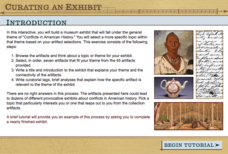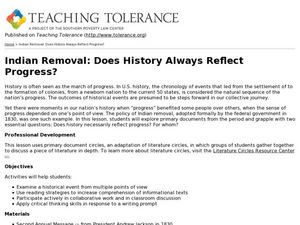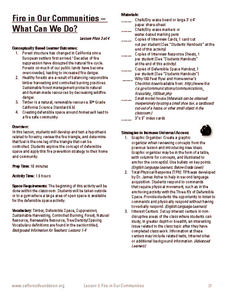Annenberg Foundation
Curating an Exhibit
A curated exhibit at a museum has a point of view. Artifacts are selected and arranged to cause viewers to contemplate this point of view or theme. An interactive provides class members with an opportunity to create an exhibit, to curate...
Curated OER
Reliving History through Slave Narratives
Helpful for an American literature or history unit, this lesson prompts middle schoolers to examine slavery in the United States. They read slave narratives that were part of the Federal Writers' Project and then conduct their own...
Curated OER
Compare and Contrast Cultures
Using informational text to make cross cultural comparisons is a great way to build a global understanding and comparative analysis skills. With several handy worksheets and a Venn diagram the class will read to make cross textual...
Curated OER
In Search of Ethnic Identity in Selected Narratives: New Reading, New Meaning
Students read texts reflecting multiple cultural perspectives.
Curated OER
Northern and Southern Differences in 1856
Fourth graders investigate differences between the ideology of the Northern and Southern states in 1856. For this states' history lesson, 4th graders examine the needs for slaves in the Southern agricultural economy, and compare it to...
Curated OER
Indian Removal: Does History Always Reflect progress?
Students explore the idea that progress for some might not mean progress for all. In this Native American lesson, students recognize different viewpoints about historical events through the study of primary documents. Students decipher...
K12 Reader
Different Perspectives: The American Revolution
Prompt your young historians to hone in their reading comprehension skills by considering the fascinating perspective that Rudyard Kipling offers in his poem, "The American Rebellion", which provides an alternative perspective toward the...
Huntington Library
Everyday Life - Exploring the California Missions
Young scholars relive history as they examine primary sources that document everyday life in the California missions. During a class viewing of the included slideshow presentation, children analyze documents, paintings, and drawings in...
J. Paul Getty Trust
Exhibiting Common Threads
Artists working in different media often explore the same themes—to model how these same themes weave their way through different forms of artistic expression, scholars analyze images by Dorothea Lange, identifying key themes in her...
Curated OER
Understanding Other People's Decisions
Students analyze people's choices from different points of view. They read different scenarios and explain how they would react personally in that situation. Then they analyze what they would do in another character's position and...
American Battle Monuments Commission
World War II: A Visual History
Explore the enormity of World War II, including its causes, prominent battles, and historical figures, with an interactive map and timeline. Divided into each year from 1939 to 1945, as well as sections pre- and post-war, the resource...
Curated OER
Civil War Research
Eighth graders research different aspects of the Civil War using various multi-media techniques. Students create a report based on their research that includes views of the war from the point of view of the North, South and slaves.
Teaching Tolerance
Thanksgiving Mourning
Two primary sources, a speech, and an article provide tweens and teens with different perspectives of the American Thanksgiving holiday. After analyzing Wamsutta James' suppressed speech and Jacqueline Keeler's article, class members use...
Digital Public Library of America
Frederick Douglass and Abraham Lincoln
Frederic Douglass and Abraham Lincoln, although dissimilar in their backgrounds, were united in their views about slavery. A set of 14 primary sources permits scholars to examine the views of these two powerful men.
Digital Public Library of America
Fannie Lou Hamer and the Civil Rights Movement in Rural Mississippi
Good primary resources, offering different perspectives on important issues and events, are hard to find. A packet of 12 primary source images, videos, audio recordings, records, and newspaper articles related to the 1960s civil rights...
American Institute of Physics
African American Physicists in the 1960s
Physicists Herman Branson and Tannie Stovall provide young scholars with two very different perceptions of the status of African American physicists in the 1960s. After reading and comparing the bios of these two men, class members read...
Curated OER
The Good, the Bad, and the Goofy
Upper elementary learners read about jobs on a cattle drive and the lives of cowboy during U.S. Westward Expansion. They create a "Help Wanted" poster for one of the jobs. After reading primary source accounts of cowboys, they write...
Forest Foundation
Fire in Our Communities - What Can We Do?
Learn about defensible space and renewable resources with a lesson about forest fires. After exploring the ways that humans have impacted the environment, kids conduct mock interviews about differing points of view in the conservation...
C-SPAN
Electoral College Pros/Cons and Alternatives
If every vote counts, why do we need the electoral college? Middle and high schoolers study the Constitutional precedent of the electoral college, as well as its place in historical and modern elections, with an engaging social studies...
Library of Congress
Uncle Tom’s Cabin and the Fugitive Slave Act
From the time of its publication, Uncle Tom's Cabin has been controversial. To better understand the debate, class members first examine a broadside decrying the Fugitive Slave Act of 1850, and then two newspaper reviews of the novel...
Ohio State University
Lesson Plan on China
Scholars ponder the beliefs of Confucianism. After reading several sayings made by Confucius, participants complete a chart filling in what each saying means using their own words. Using the same quotes split in half, pairs match...
Curated OER
Presenting Constitutional Issues in a Non-adversarial Mode
Students study the Fourth, Fifth, Sixth, Eighth Amendments to the US Constitution. They apply different points of view to their research and present their finding to the class.
Curated OER
The Treaty Trail: Examining an Artist's Perspective
Elementary school leanrners examine artwork from the time period of the United States and Native American treaties. They discuss the causes and effects of the treaties being signed. They also examine how cultural perspective influences art.
Curated OER
Preserving Our Barns
Students examine the different points of view when it comes to preserving barns. Using the internet, they work together to identify the risk involved in renovations and a barn in their local town that needs to be renovated. They create...

























